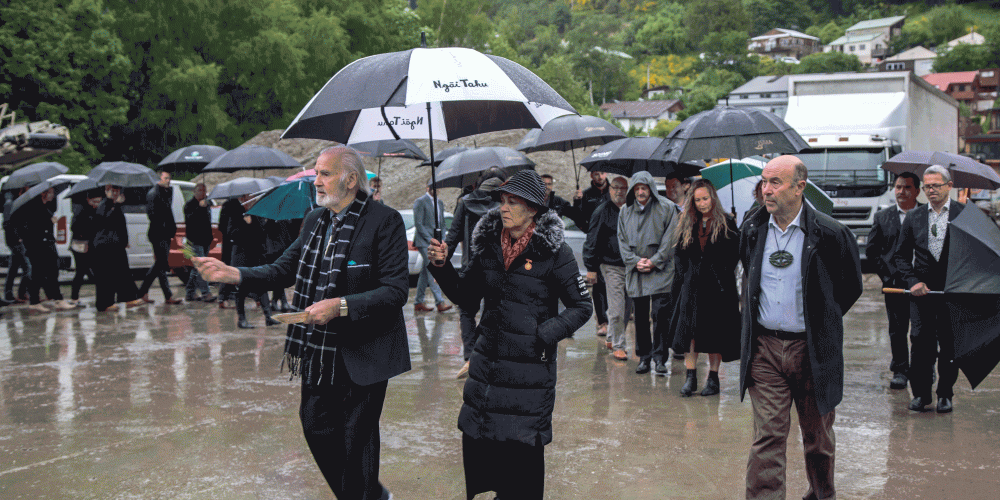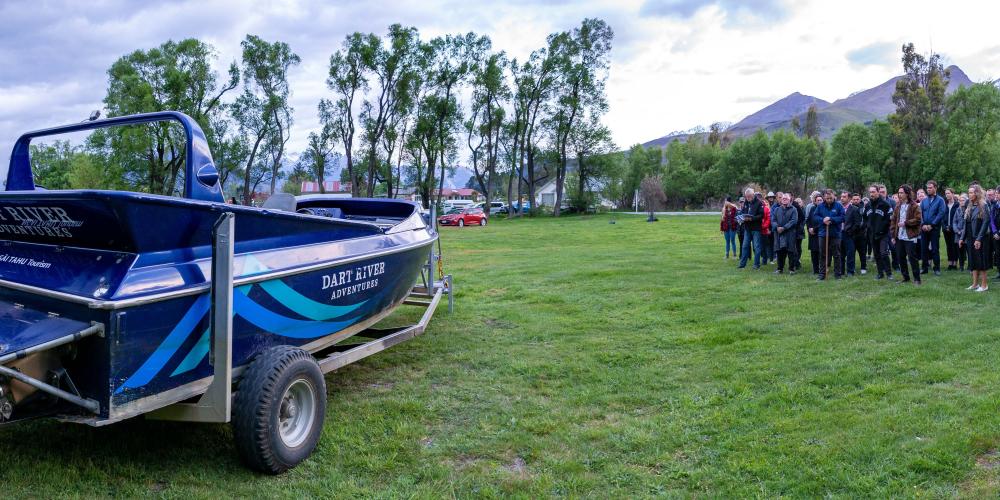It’s an impressive and fast-paced career to date, yet she has still found the time and opportunity to take another bold leap – moving from newly-elected national board member to chairperson of New Zealand Young Farmers in the space of just one month. Despite the huge jump in responsibility, Ash-Leigh is taking the promotion in her voluntary role well in her stride.
“It’s scary and overwhelming to take on a role like this, but I know I’m only going to learn. My thought process around the whole thing has been ‘sink or swim, there’s only one way and that’s up’. I definitely got thrown in the deep end, that’s for sure.”
Although she doesn’t come from a farming family, Ash-Leigh and her brother grew up with a rural outlook, on a small lifestyle property in Greenpark, near Lincoln. She got her first taste of the farming lifestyle when she was in high school, and took a part-time job as a relief milker for a local farmer.
Her journey with New Zealand Young Farmers (NZYF) began after a first stint at university left her questioning academic life. Leaving study behind in 2010, she fell back on her high school experience and applied for a dairy farming job in Dunsandel.
“My friends thought I was crazy. It was getting up at the crack of dawn to milk cows, isolation, and exhaustion; there were definitely times when I’d sit on a hillside and have a cry,” Ash-Leigh laughs.
Adjusting to the physically and mentally demanding lifestyle, 21-year-old Ash-Leigh joined the local NZYF Dunsandel Club in an effort to meet peers “and basically get off-farm when I could.”

Ash-Leigh fledged into a fully capable dairy farmer over three years in Dunsandel before moving to a drystock farm in Darfield, where she was responsible for 1200 head of cattle. Having kept up her involvement in the NZYF clubs, Ash-Leigh rose through the ranks to become vice-chairperson of the Tasman Region (covering north of the Rakaia River to Nelson/Marlborough and across to the West Coast). The national organisation caters to young farmers under 31 years of age in 80 clubs nationwide. She says being a member of NZYF offers a range of benefits, such as providing a community for grass-roots members to ward off isolation in rural areas, participation in the FMG Young Farmers Contest, and following a governance or leadership pathway similar to her own.
“Opportunities to step up and be involved in governance are not common at my age, so it is awesome to have that exposure to sit around a board table and get comfortable in those spaces,” she says. “Sure, there would’ve been easier pathways; but would I have had the same learning opportunities? Probably not.”
Channeling her inner Ngāi Tahu wahine toa, part of her Young Farmers leadership role has echoed and strengthened a collective challenge to the male-dominated image of the farming industry. Ash-Leigh says the physical demands of the job have never, and still don’t, preclude women from successful farming careers.
“It’s definitely an ‘old school’ sector, but I always found on-farm it was a case of needing to think smarter, not necessarily work harder,” she laughs.
“These days, NZYF has a roughly 50/50 split of men and women within membership. I am the second female chair; in October we appointed our first ever female CEO; the FMG Young Farmer Contest has just appointed the first chairwoman, and the NZYF-owned farm just outside Auckland also has a chairwoman on its board.
“For the first time ever, we have women holding the four highest roles in our organisation. I think that speaks volumes as to where the sector is shifting.”
Breaking away from the hands-on side of her career, it was in her fifth year of farming full-time that a mentor sat Ash-Leigh down and “gave her the hard word.” Farming had changed, and there was so much more farmers needed to be and do – innovative technologies had become a requirement of the industry, not just an option.
“I’ll always remember him sitting me down at the coffee table for that talk. I was at a crossroads at that stage, because I was trying to decide whether to follow my heart and go work on a cattle station in Australia, or go back to university and get some credentials behind me,” Ash-Leigh reflects.
“I knew I didn’t want to be milking cows for the rest of my life, and that I really wanted to challenge myself and use my brain in other ways.”
It was through her application to the Lincoln University Diploma in Agriculture in 2015 that she discovered Whenua Kura, an iwi-supported initiative to grow the next generation of Māori leaders in the primary sector industries through education, employment, and enterprise. Whenua Kura became a doorway for her to learn more about her Ngāi Tahu whakapapa and te ao Māori while embarking on her studies. As a recipient of a Whenua Kura scholarship, she went on her first noho marae and started to make those first few connections with the iwi – and in doing so, has been able to help her wider whānau do the same. “My mum has reconnected with our rūnaka as a consequence of my work with Ngāi Tahu,” she says proudly. “She visited our marae at Karitāne last year, and stayed for the weekend as part of a noho marae.”
As part of the Whenua Kura programme, Ash-Leigh was also offered a summer internship with Ngāi Tahu Farming (NTF) in 2016. Hitting the ground running as Sustainability Coordinator for the business, Ash-Leigh was responsible for implementing priority projects from a sustainability matrix developed by the NTF board and environmental advisors. Intending to head back to university and complete a fast-tracked Bachelor of Commerce (Agriculture), NTF threw a spanner in the plans by offering her permanent employment as Technical Farm Manager, a support role for Te Whenua Hou farms in North Canterbury.
“That’s why I’m not a big fan of planning – you can never know what’s around the corner. They saw something in me that I didn’t, and asked me to stay on while continuing my studies part-time.”
Ash-Leigh says the role as Technical Farm Manager grows alongside her, but the bulk of it covers supporting the farm managers with auditing and compliance of eight dairy farms and one support farm for the Waimakariri District Council and milk producers Fonterra and Synlait, as well as operationally supporting sustainable farm production.
“I also do a lot of training and support for our kaimahi out here. I like to think of myself as an extension arm to the farm managers, because they’re so busy with the day-to-day operations, so I support them with the auditing and reporting that is required in farming today.”
However, the role is stretching more than just her technical skills. Working within an office context at Te Whare o Te Waipounamu in Christchurch, as well as with dozens of farming staff, is putting her entire toolkit to the test.

“Our farm managers have all got their own personality quirks, and I have to be able to work with a broad range of people, to listen and let them know I am a support to them. I think I’ve done a pretty good job of gaining their trust – they call me ‘Mum’ now,” she laughs.
“We also want to make sure we are leading the way in the industry, and that’s something I really thrive on. For example, our dairy farms were the first in this zone catchment [Waimakariri] to gain A grade audits [December 2018], which basically means we’re operating above industry standards; and auditors have a high level of confidence that we meet all management objectives set by Environment Canterbury.”
Ash-Leigh has also seen exciting research and development on the farms, including a new product trial aimed at reducing nitrogen leaching in soil, and by extension, the water table and waterways. Ecotain is a plant product developed under the national Greener Pastures Project, led by Agricom with Lincoln and Massey Universities and Plant & Food Research. The broadleaf plantain is planted across pastures and has impressive abilities to reduce the presence and impact of nitrogen from stock urine far more effectively than typical pasture plant species. And it’s accomplishments like these Ash-Leigh is keen to see shared within the tribe.
“There is such a conflict within the iwi around dairy operations. We know that some of the iwi are not happy to be in farming, but if we’re setting a precedent to encourage other farmers to follow our lead, I feel like we can improve the industry as a whole by taking a leadership role.”
Alongside a commitment to improving sustainability in intensive farming practices, NTF is also investigating alternative uses for iwi-owned land. Ash-Leigh says there’s a good deal of excitement around the potential for diversification, including the development of a trial orchard and securing hemp licensing. Ash-Leigh believes the farming community has a genuine desire to better care for the environment, but knows she walks the line as a Māori woman working in the farming industry, a contentious issue for iwi members and for Māori across Aotearoa.
That line is one Ash-Leigh has found difficult to navigate, particularly while she is still on her own journey to find her place within the iwi and te ao Māori after generations of disconnection. Despite growing up aware of her Ngāi Tahu whakapapa, Ash-Leigh says it was still an intimidating process to enter iwi spaces, at times feeling like an outsider.
“The scholarships and opportunities the iwi has set up offer such a great opportunity for people to reconnect. I don’t know if I would have been brave enough to do that on my own,” she says.
“I was always passionate about farming, and it is just so cool to now to be able to weave Ngāi Tahu values into our farms and the wider farming sector. I’m proud to be working for my iwi, and I feel like I know who I am now.”


